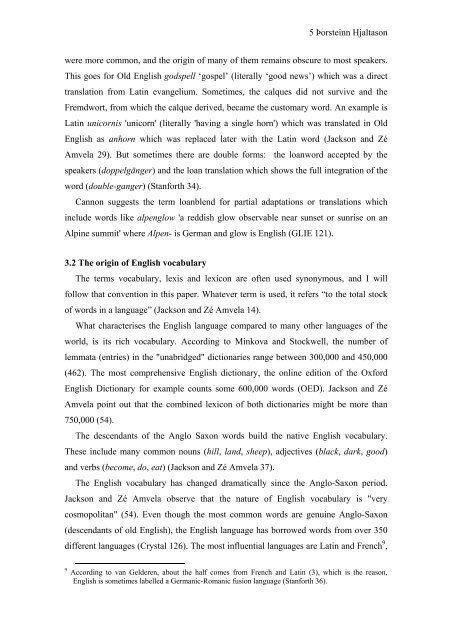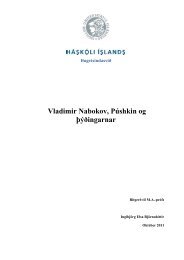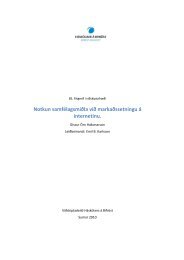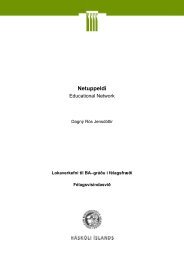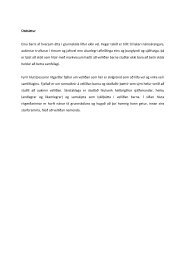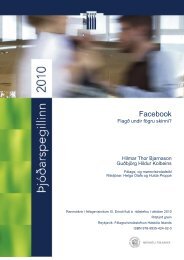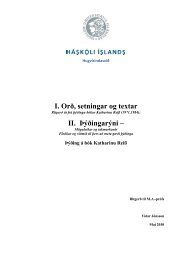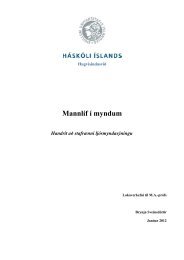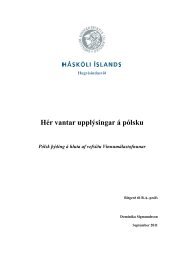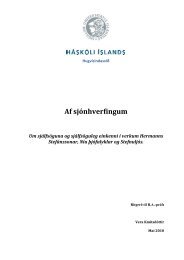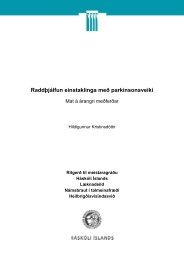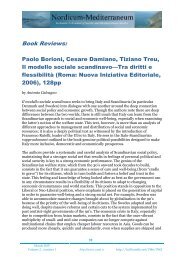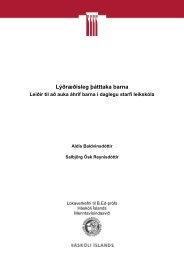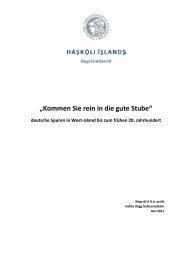Capturing the Zeitgeist Native German Loanwords in ... - Skemman
Capturing the Zeitgeist Native German Loanwords in ... - Skemman
Capturing the Zeitgeist Native German Loanwords in ... - Skemman
You also want an ePaper? Increase the reach of your titles
YUMPU automatically turns print PDFs into web optimized ePapers that Google loves.
5 Þorste<strong>in</strong>n Hjaltason<br />
were more common, and <strong>the</strong> orig<strong>in</strong> of many of <strong>the</strong>m rema<strong>in</strong>s obscure to most speakers.<br />
This goes for Old English godspell ‘gospel’ (literally ‘good news’) which was a direct<br />
translation from Lat<strong>in</strong> evangelium. Sometimes, <strong>the</strong> calques did not survive and <strong>the</strong><br />
Fremdwort, from which <strong>the</strong> calque derived, became <strong>the</strong> customary word. An example is<br />
Lat<strong>in</strong> unicornis 'unicorn' (literally 'hav<strong>in</strong>g a s<strong>in</strong>gle horn') which was translated <strong>in</strong> Old<br />
English as anhorn which was replaced later with <strong>the</strong> Lat<strong>in</strong> word (Jackson and Zé<br />
Amvela 29). But sometimes <strong>the</strong>re are double forms: <strong>the</strong> loanword accepted by <strong>the</strong><br />
speakers (doppelgänger) and <strong>the</strong> loan translation which shows <strong>the</strong> full <strong>in</strong>tegration of <strong>the</strong><br />
word (double-ganger) (Stanforth 34).<br />
Cannon suggests <strong>the</strong> term loanblend for partial adaptations or translations which<br />
<strong>in</strong>clude words like alpenglow 'a reddish glow observable near sunset or sunrise on an<br />
Alp<strong>in</strong>e summit' where Alpen- is <strong>German</strong> and glow is English (GLIE 121).<br />
3.2 The orig<strong>in</strong> of English vocabulary<br />
The terms vocabulary, lexis and lexicon are often used synonymous, and I will<br />
follow that convention <strong>in</strong> this paper. Whatever term is used, it refers “to <strong>the</strong> total stock<br />
of words <strong>in</strong> a language” (Jackson and Zé Amvela 14).<br />
What characterises <strong>the</strong> English language compared to many o<strong>the</strong>r languages of <strong>the</strong><br />
world, is its rich vocabulary. Accord<strong>in</strong>g to M<strong>in</strong>kova and Stockwell, <strong>the</strong> number of<br />
lemmata (entries) <strong>in</strong> <strong>the</strong> "unabridged" dictionaries range between 300,000 and 450,000<br />
(462). The most comprehensive English dictionary, <strong>the</strong> onl<strong>in</strong>e edition of <strong>the</strong> Oxford<br />
English Dictionary for example counts some 600,000 words (OED). Jackson and Zé<br />
Amvela po<strong>in</strong>t out that <strong>the</strong> comb<strong>in</strong>ed lexicon of both dictionaries might be more than<br />
750,000 (54).<br />
The descendants of <strong>the</strong> Anglo Saxon words build <strong>the</strong> native English vocabulary.<br />
These <strong>in</strong>clude many common nouns (hill, land, sheep), adjectives (black, dark, good)<br />
and verbs (become, do, eat) (Jackson and Zé Amvela 37).<br />
The English vocabulary has changed dramatically s<strong>in</strong>ce <strong>the</strong> Anglo-Saxon period.<br />
Jackson and Zé Amvela observe that <strong>the</strong> nature of English vocabulary is "very<br />
cosmopolitan" (54). Even though <strong>the</strong> most common words are genu<strong>in</strong>e Anglo-Saxon<br />
(descendants of old English), <strong>the</strong> English language has borrowed words from over 350<br />
different languages (Crystal 126). The most <strong>in</strong>fluential languages are Lat<strong>in</strong> and French 9 ,<br />
9 Accord<strong>in</strong>g to van Gelderen, about <strong>the</strong> half comes from French and Lat<strong>in</strong> (3), which is <strong>the</strong> reason,<br />
English is sometimes labelled a <strong>German</strong>ic-Romanic fusion language (Stanforth 36).


